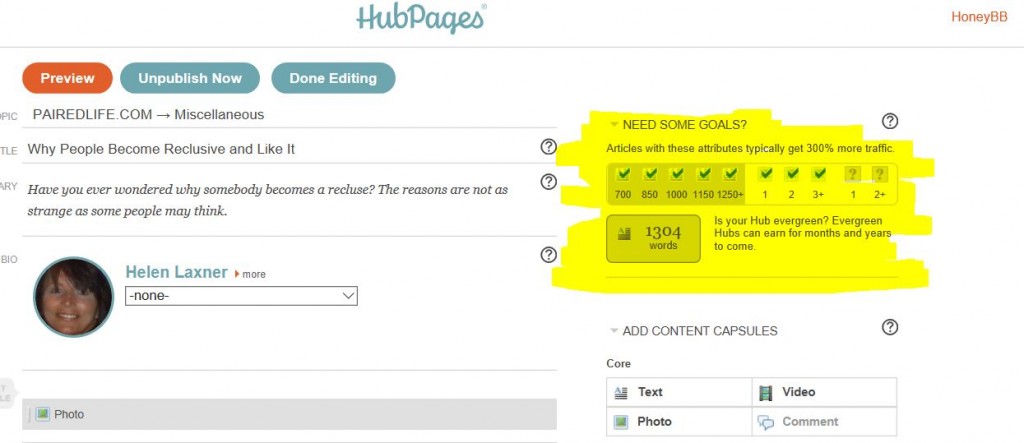Article Length
- cursedempathposted 7 years ago
0
Hello Everyone!
Small fish in a big ocean here. I have a question about article length.
There are a few theories on this via Google search, which in turn creates some confusion. So I figure that maybe I should go directly to the source, which would be those who have been at it for some time and know the ropes.
So what I am wondering is, is it better to keep an article to the the lowest standard word count (I believe that for a successful piece, it is about 1100 at the very minimum to produce quality content. To my understanding anyways) or is it better to create lengthier pieces in order to be more successful in attracting/keeping an audience?
I tend to be very thorough which is equal to being very wordy. Being that we are living in the era of "article skimming", I am almost wondering if length could be to my detriment.
Would love to get some insight on this one if you have a moment!
Thank you very much
keep writing my dear. until sometime, you will have great curiosity. and read your writing again. understand the rules. You have no questions to explain? just write it first. and re-understand from the rewards that you can. smile too you.

Did you notice the highlighted portion of this when you were writing your article...it gives you an idea of how many words and pictures. I try to get at least to the 1250 point but it doesn't help your article if you repeat things so my best advice would be to get your point across in the least amount of words you can but if doing that doesn't bring you up to 1100 or so, try to think of more points you can add to your message.As I speak for myself: I tend to lose concentration when I have to read a very long article.
I took a peek at your featured hub and what I saw some things that need improving.
All your titles and subtitles need to be capitalized and some text capsuls contain a lot of text. I would recommend to split them up in smaller sections. It's a bid odd to start with reason 10 and counting down, doesn't make sense to me, but that's a choice.
I think you should spend some time reading the articles in the HP Learning Centre.My only guide around this is that once I think I have provided all the information I know of the topic and answered the question substantially, I stop. As long as I am beyond 1250 and below 3000, I publish the article.
I had an English teacher once who said "say what you have to say and then get off the page". I love that advice. My articles tend to be shorter, but personal preference and writing styles play an important part. If you feel you're adding words just to add length, then it's too much.
I'm with you - say what you have to say and get off the soapbox.
Unfortunately, internet publishing is about more than useful content, for if it cannot be found it is useless. And that means pleasing the Great Google, which takes some length and keywords.
So if you've said what needs to be said and the length is too short to please Google, find another point to make or expand on one. It's a balancing game, and the balance is not always with brevity.
It boils down to whether you are having a lot of words, or a lot of content.
If you have a lot of content, why not?
Incidentally, my best performing articles here or elsewhere are the long ones. More than 3k.- cursedempathposted 7 years ago
0
You guys are awesome. Thank you all for the great insight! I think that shortening it up is really the better way to go about it myself, so that is what I am going to work on (basically, shutting up and avoiding what isn't relevant).
Thank you all! Hi there,
I’m still relatively new to H.P., but I’ve noticed that my lengthier articles (around 2500 words) achieve a better score… though it may have nothing to do with length. However, it depends what your subject matter is. If I’m writing 2500 words on “How to Make a Perfect Hard-Boiled Egg,” then chances are that I’ve given way to verbosity.Haha! Yes you are absolutely right. What I struggle with is making the point while also justifying the point. I find it very hard to include all factors and variables while keeping it short. I have been a writer for a very long time, however when I say this, I mean that it has always been my personal hobby. No formal training and this is really the first attempt at actually creating content and (hopefully) attracting an audience. Lots of work to still be done indeed lol!
When I first started writing at HP, my articles were quite long. More recently I have radically shortened their length. Personally, I like what Mary said above about the “beyond 1250 and below 3000” strategy. I had an English professor in undergraduate school who had a policy when it came to writing papers: “Get to the point!” I also learned recently that many or most Internet users have relatively short attention spans and often skim an article rather than read it verbatim. I’m much the same too.
It's tough to adjust to this I find (the short attention span reader trend). I can't say that I blame people, especially when considering that the average Joe is literally bombarded with content non-stop. Readers are kind of forced to skim, because the sad fact is: an awful lot of blogs are exactly the same. They are "SEO optimized" is the problem (because they have to be) and when this is a necessity to rank with the major search engines....the "unique" part of content tends to become anything but.
I am going to follow that same rule. I think that it is a great way to go about it (beyond 1250 and below 3000).
I will keep practicing
I have eight articles of 3000+ words, as well as one (a photo essay) of just 703 words, all on niche sites. I don't really think about a piece being too long because I'm convinced that if the material is of interest to the reader, they'll actually appreciate the depth. I try to give the subject the amount of explanation required to fulfill the promise implied in my title without regard to the number of words it requires.
I think a lot of it has to do with who you think your audience is. If it's people who may have only a mild curiosity about your subject, then they probably will just skim, and you don't want the article to be too long. But if you are aiming for readers who have a real interest in what you're writing about, they'll stick with you as long as you are providing good info. So, IMO attention span is not a limiting factor on length.
One way to accommodate both types of readers, those who skim and those who are willing to dig deep into the subject, is to make sure your capsule headers make a good outline of the content. Those headers are what skimmers will see as they scan your article, and they also show in-depth readers that your content is worth their attention.Try writing all that you wish to say and let it be for a few days or even a week. Verbosity will become more apparent and then you can do some slicing, if need be. Follow your instincts and try to strike a balance (i.e. Goldilocks’s hub -not too short, not too long…just right.) The main point is to engage the reader’s attention and interest. Maybe have someone proof read your articles as well. Ron is right-on.
Related Discussions
- 27
Article Length
by Natalie Frank 7 years ago
I was just wondering what people's take on article length is. Do you make a point of including as much info as possible in your article going for longer length or if you can cover it decently in a shorter length do you prefer to stick with that? I'm seeing some articles that are well...
- 20
Article Length
by Doug West 8 years ago
I tend to write longer articles for Hubpages (2000 plus words). Would I get more traffic if I wrote two 1000 word or three 700 word articles on related subjects rather than one longer article? Please let me know your experiences and thoughts.
- 27
length of article
by Jessica J Lockhart 7 years ago
Dear all, HubPages is telling me that my article is too short. Its 950 words and many of my previously published articles were that long or shorter. Any ideas?
- 19
Is there an upper limit to word length?
by Melanie Palen Shebel 2 years ago
Is there some number where large word length starts to hurt articles in search?I'm writing an article and it's quite lengthy already. I'm not running on and on, I just want to cover everything.Is there some number that is just too much and starts to negatively impact SERPs?
- 28
Is there a Maximum Size Limit for a Hub?
by Gordon Hamilton 14 years ago
I have tried the learning centre for this and if it is covered there and I have missed it, I apologise.I know that ideally we should create a number of Hubs around a topic when we think this might be a problem but in this very specific case and in relation to the idea I am kicking around in my head...
- 52
Is it always ill-advised to have an over 5000 words hub?
by Brian Leekley 12 years ago
In their teachings on writing stellar hubs, the HubPages staff has sometimes said that an ideal hub is 1,500 words long and has sometimes said that an ideal hub is 1,150 words long. Numerous hubs by hubbers on hubbing have recommended that a hub should be at least circa 400 to 500 words long, at...
















